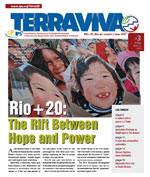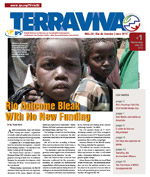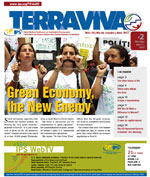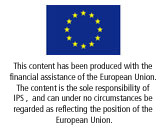By Amantha Perera
COLOMBO, Sri Lanka, Jun 16 (TerraViva) Equal access to riches and resources is a must if the world’s burgeoning urban population is to achieve sustainable development, experts say.

Asia's fast growing cities like Bangkok, Thailand need to include marginalised sections in economic growth to achieve sustainable development, experts say. Credit: Amantha Perera/IPS
The world population surpassed seven billion last year, and at least half are urban dwellers, according to World Bank estimates.
“The decision is whether we want to lock a large portion of the population out of the prosperity,” George McCarthy, director of the Ford Foundation’s Metropolitan Opportunity programme, told IPS.
McCarthy says cities have to invest in housing, transport, schools and public infrastructure in a holistic manner that would allow for economic growth of all their citizens and not a select few.
The Ford Foundation is currently working in number of cities in the U.S. to promote this integrated approach, and is now looking to expand its programme internationally.
The foundation is also campaigning to get a meaningful dialogue going on sustainable urbanisation at the Rio+20 conference in Brazil this month.
Marginalised millions
Grappling with a large population excluded from economic growth is nothing new to Asia’s fast growing cities like Mumbai, India, Dhaka, Bangladesh – the fastest growing city in Asia – and Colombo, Sri Lanka. All of them are now grappling with a large portion of their populations who live in poverty and informal settlements.
According to Indu Weerasooriya, deputy director general at the Sri Lankan Urban Development Authority (UDA), 47 percent of the capital city’s population live in shanties or slums. This arrangement not only puts the city at risk of frequent flash floods, but means residents lack the coping mechanisms needed to face extreme weather events, she told a recent regional summit on sustainable urban development.
The World Bank estimates that 30 percent of Colombo’s drainage system has been lost to illegal landfills in the last decade.
The UDA is currently engaged in a massive project to relocate 70,000 dwellers from these informal settlements. The government is building 10,000 high-rise residencies for the relocation, with an additional 15,000 also planned.
The costs of undoing ad-hoc city development runs into millions, as the Sri Lankan experience shows. The government and the World Bank are also working on a 233-million-dollar metro Colombo urban development project that is clearing waterways.
Neighbouring Dhaka is facing a similar problem, according to Nazrul Islam, chairman of the Centre for Urban Studies in Dhaka, Bangladesh.
“Two of the four rivers that run through the city are drying up,” he told TerraViva. The reason? Overuse and overpopulation.
Abha Joshi-Ghani, manager of the World Bank’s urban development and local government unit who was recently in Sri Lanka, told TerraViva that the main reason for cities to feel the pressure of marginalised populations was decades of unplanned development.
“Cities have expanded haphazardly, but have not kept phase with providing services to all its citizens,” she said.
The Ford Foundation’s McCarthy told IPS that if cities are to avoid these mistakes, they have to include all their citizens in the development plans and offer everyone a chance to share the successes.
He admits it is a big challenge, especially in Asian cities, home to millions acutely lacking space and resources.
“If you are going to change the trajectory of a city where half the population live in informal housing, that is not going to be easy.”







 Add to Google
Add to Google







